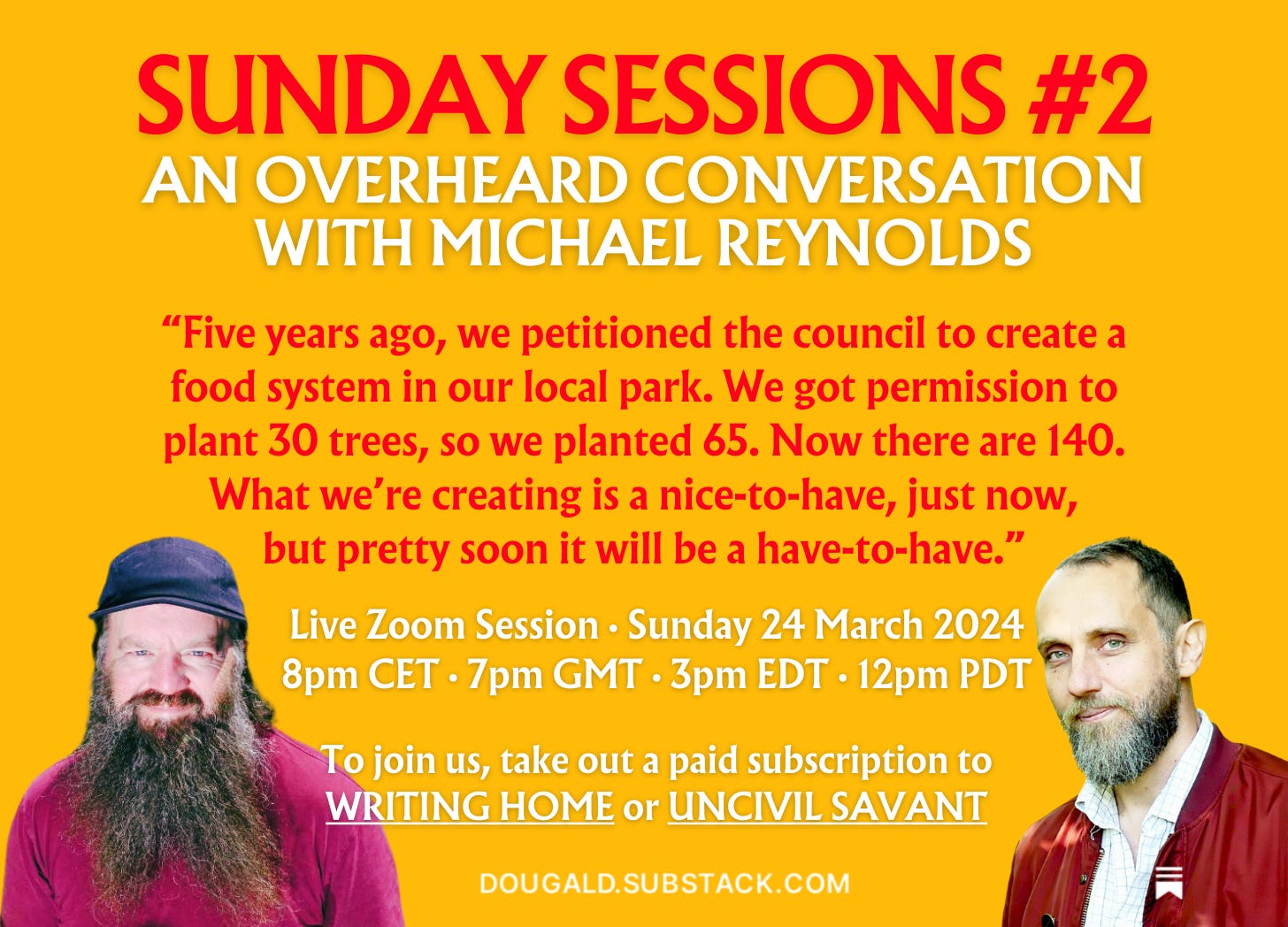A Food Commons
Invitation to this week's Sunday Session with Michael Reynolds
Greetings from London, where Anna, Alfie and I have just arrived as guests of
and family. I’m writing with an invitation to the second in this season of “overheard conversations”, when I’ll be talking to Michael Reynolds about the urban food commons that he and his friends have created over the past eight years or so in Christchurch, New Zealand. This will be the start of a thread around the future of food that will run in and out of these Sunday Sessions. So join us this Sunday – as always, the live Zoom session is open to anyone with a paid subscription to this Substack, while the recording of the first forty minutes will be available to everyone.It was the first time we had put out an invitation to an online series with a school called HOME. Those first months of the pandemic were a liminal time, when everyone’s plans had been thrown off track. As the northern spring turned to summer, we’d gather week by week in the patchwork of a Zoom window. My commitment was to show up each week and teach from the heart, telling stories from the work I’ve done, retracing the paths I’d walked and sharing what I’d learned from the thinkers, writers, artists and activists whose influence formed me. From there it would open out into a conversation, rolling on into the weekly afterparty.
People joined the calls from all over the world. In the course of a session, you could watch the light fading slowly out of the window of a cabin in the Shetlands, while elsewhere in the grid of faces, the dawn was arriving in the background of an office in New Zealand. There was a guy in Australia who joined us each week at just past four in the morning his time. To have people haul themselves out of bed in the dark to listen to you – well, it makes you want to choose your words with care.
As the weeks went by, the faces grew familiar. Among them, there was a man with a huge beard and kind eyes, a New Zealander who was working to reimagine the way his community feeds itself, in a city that had been through earthquakes, terror, fire and flood. In the years that followed, Michael Reynolds kept in touch with me, often responding to the conversations
and I have in .Then a few weeks ago, he sent me a short film that had been made about his project, the Roimata Food Commons. When I watched it, I knew that I wanted to invite him to be one of the voices in this first season of Sunday Sessions, the fortnightly conversations that I’m holding with people whose work crosses paths with the questions that I write about on this Substack.
There’s a moment in the film where Michael talks about the kind of food growing that is at the heart of the Roimata project: right now it’s a “nice-to-have”, he says, but pretty soon it will be a “have-to-have”. It’s a simple statement, but one that goes to the heart of the conversations we need to be having about our relationship with land and food.
The kinds of growing practices that will be needed in the world we are headed into tend to be marginal to the ways of growing food that “make sense” under current social and economic conditions. So they tend to survive in pockets that are insulated in one way or another against the dominant economic logic that structures our societies. This can mean that they survive as hobbies or as luxuries, a “nice-to-have” for those with the time or the money. These are valid tactics for keeping practices we need alive – but one of the things that inspires me about the work of Roimata is their focus on making good food available to anyone who needs to eat, regardless of their economic means.
This part of the story makes me think of the exchange of letters between
and his friend Sam about their experiences of “giving food away” (1, 2, 3, 4, 5, 5b), and also of the work of the theatre company Slung Low in the Holbeck area of Leeds, whose artistic director Alan Lane put it like this:We are telling the story that no one need go hungry in Holbeck and Beeston during this crisis. To tell this story the best way we can we have to make it true. We are making it true.
So these are some of the threads that are with me as I prepare for Sunday’s conversation with Michael. If there’s something here that speaks to you, then I hope you’ll join us.
As with the session a fortnight ago with
, we’ll have forty minutes of one-to-one conversation, followed by twenty minutes for questions from those who are with us on the call. The first forty minutes will be released as a public video. The live Zoom session and the full recording are available to anyone with a paid subscription to Writing Home, which costs $7/month or $70/year. The details you’ll need in order to join the call are below the paywall on this post.Finally, I’m immensely grateful for the support of all of you who have taken out paid subscriptions – it’s what makes it possible for me to do this work – but I don’t want anyone to be shut out of these conversations because the price is a barrier, so if you’d like to join us but can’t set up a paid subscription just now, send me a mail and I’ll send you the details for the call.
DH

